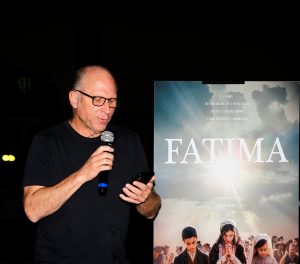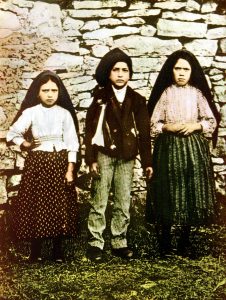One day in early 2016, Dick Lyles and Natasha Howes received bad news: The feature film “Fatima,” which they and their colleagues had been working on for almost 10 years, would not be ready in time for a 2017 release.
The goal had been to launch the movie, a historical drama based on the 1917 reported Marian apparitions to three young Portuguese shepherds, during the event’s 100th anniversary year. But to the team’s dismay, production financing was not yet enough to bring the project to the finish line by then. The future of the project was a hazy one at best.
Still, they would not give up hope. “Every time we encountered a delay,” Lyles, one of the producers, told Angelus in a phone interview, “we would get on our knees and say, ‘OK, [Lord], this is it: Do you really want us to continue with this? Do you want us to go forward?’ And then our prayers would be answered in some really profound and miraculous way.”
Now, three years later — and after two more delayed releases due to the coronavirus (COVID-19) pandemic — an answer to those prayers seems to be on the horizon, as “Fatima” is finally approaching widespread release this month.

The story of the Virgin Mary’s monthly apparitions to 10-year-old Lúcia Santos and her two younger cousins has been adapted into countless books, children’s videos, art pieces, and documentaries over the last century. But unlike previous adaptations, “Fatima” aims to be more than a spiritual or instructional aid.
“The whole purpose of the new Fátima movie was to work with what we call an A-list formula,” producer Howes told Angelus in a phone interview, ... “to be able to push the meaning and message of Fátima into the mainstream audience.”
That formula involved approaching prominent actors and filmmakers whose experience stretched far beyond the faith-based media world, backed by a budget of more than $17 million. With recognizable names such as Harvey Keitel (“The Piano,” “The Irishman”), Joaquim de Almeida (“Queen of the South”), and Marco Pontecorvo (“Pa-ra-da,” “Game of Thrones”) on its credits list, it appears the formula had some effect.
In search of a ‘phenomenal story’
When James Volk founded Origin Entertainment in 2007, he did so with the intention of bringing something entirely new to the movie scene.
“We want our audiences to be transformed,” said Lyles, the production company’s CEO who has been working alongside Volk since the founding. “And so we decided that the best way to do that was to focus on stories of the good, the true, and the beautiful — stories of true heroism and courage that inspire.”
With this goal in mind, all that remained was to find the right story to tell. Soon after the founding of Origin, Volk and Lyles met Natasha Howes, an expert on Fátima, and the idea of a feature film quickly arose.
“We chose Fátima [as a subject] because it was a recipe for all of those [elements],” said Lyles. “It’s a phenomenal story.”

Howes had been working on the historical film “The 13th Day,” also based on the famous apparitions. “I’d spent quite a bit of time at Fátima,” she told Angelus. “I got to know the key authorities very well and became kind of a trusted persona within this Fátima environment to work with this authenticated message.”
Even though Howes had just finished a Fátima project, she jumped at the idea of joining Volk and Lyles in creating a feature film on the subject. Unlike “The 13th Day,” which was tailored to a Catholic audience, the idea behind “Fatima” was to reach people of all backgrounds.
To do so, the film’s creators knew they had to think big. Once a first draft of the script was completed in 2009, they started approaching big-name actors and directors.
Not surprisingly, many turned the offer down, uninterested in a story they saw as too faith-based.
But not everyone responded in this way. “[Some] saw a great script, a great story, [and] great potential to make a positive difference in the world,” said Lyles.
Much to the Origin team’s delight, such was the reaction of Marco Pontecorvo, who became the film’s director.
“I just have to say this movie was made for Marco, and Marco was made for the movie,” said Lyles.
Besides his professed love for the story, Pontecorvo’s professional background made him a perfect fit. The cinematographer and director, who contributed to the smash hit HBO series “Game of Thrones,” comes from a family of filmmakers, and importantly, had on-set experience working with children.
In addition, Origin needed someone with experience and an eye for filming on a grand scale. “[We were] shooting big,” continued Howes. “Multiple locations, set builds ... [often in] remote areas. We took over a village and rebuilt it in the north of Portugal.”
The scenes of Our Lady’s apparitions to the children, for instance, were shot in a provincial park north of Lisbon. Besides building olive groves, wheat fields, and swimming pools to create artificial rain, the crew had to ward off wild boar and deer in the area and manage costume changes for thousands of extras.
With Pontecorvo, Origin got not only a seasoned director, but also a host of seasoned crew members who worked with him. Among the dozens of Italian filmmakers who headed various production departments for the film, many of them had years of experience and award-winning accomplishments, from costume designer Daniela Ciancio to production designer Cristina Onori.

©2020 Picturehouse
‘The human story behind the story’
Another part of the strategy to make “Fatima” a mainstream movie was to tell the characters’ stories in a way that audiences of any or no faith background could relate to.
While working with representatives at the Shrine of Fátima to maintain accuracy, the production team focused on creating what Howes called “the human story behind the story of the apparitions.”
One of the key strategies for nourishing this human element was to tell the story through the eyes of Lúcia, the determined child who stands at the heart of the event.
For Stephanie Gil, the 14-year-old Spanish actress who plays Lúcia, assuming the role meant learning as much about her world as possible.

“The time period in which she [Lúcia] lived in is so different [from] this time period, of course,” Gil told Angelus, “and I had to learn how she walks, how she talks, how she plays her games, her way of socializing even, with adults or even with her own cousins.”
Gil also found plenty of human qualities to admire in her character, who died in 2005 and was declared “Servant of God” by Pope Francis 12 years later in 2017 at the centenary celebration of the apparitions.
“[Lúcia] has a lot of inside life,” she said. “She’s got this way of always going somewhere out, sitting down, and thinking about what’s going on. ... And she is really, really strong and super brave and will not stop until people believe her.”
While the filmmakers strove to humanize Lúcia, they wanted to add nuance to supporting characters as well. By highlighting the backdrop of World War I and the aggressiveness of Portugal’s anti-clerical, secularist government, for instance, they aimed to convey in what a troubled moment the apparitions took place.
“The [children’s] parents were really afraid that what was going to happen was they were all going to get persecuted and maybe put in jail — or worse — because of what the kids were saying,” said Lyles.
Dealing with delays
On top of the task of executing an A-list formula, the “Fatima” production and distribution teams faced multiple obstacles that have pushed back the film’s release.
The producers chose to shoot everything in Portugal in order to maintain as much historical authenticity as possible. But at the time production began, Portugal had no tax credit available to filmmakers, placing a major financial burden on the project.

Howes’ team successfully worked with Portuguese authorities to launch the tax credit, but the long process — and a lack of funding — led to the disappointing realization that a 100th anniversary release in 2017 was not possible.
But Lyles and Howes ended up seeing every setback as providential. Just one week after they learned of the 2017 postponement, the team found out that Andrea Bocelli had agreed to sing the film’s theme song. “If we hadn't had the delay, that wouldn’t have happened,” recalled Lyles. “So it’s just an amazing journey, filled with miracles and challenges from beginning to end.”
More recently, the COVID-19 outbreak has imposed more delays. Due to the pandemic, which resulted in widespread social distancing regulations and movie theater closures, the April 24 release date was pushed back, first to Aug. 14, and now to Aug. 28.
Amid these delays, the film’s distribution company, Picturehouse, launched an expanded digital marketing campaign on social media, as well as private drive-in premiere screenings across the country.
After all the logistical, financial, and scheduling challenges that dogged the filmmaking process, Howes said seeing the finished product leaves him in awe.
“I always think a movie is a miracle in the making,” she said. “To actually create, to have a movie that’s complete and ready to launch is nothing short of a miracle.”
Launching a peace plan
In a video address played at the “Fatima” screening in Los Angeles, Archbishop José H. Gomez said the film’s message is a reminder “that the mother of God has a tender love for each one of us and that she continues to be at the heart of God’s plan of redemption.”
For those who worked on the film, it was a message that ensured this was no ordinary job.
The majority of the crew was Portuguese, and Fátima meant something to all of them. According to Howes, many crew members had a grandparent or great-grandparent who stood among the crowd on Oct. 13, 1917, the day of the reported Miracle of the Sun attributed to the Virgin Mary.
“There’s three major exports out of Portugal: football, fado, and Fátima,” Howes remarked. “So it’s part of their bloodlines.”

The personal impact of the themes of faith and hope extended beyond the Portuguese crew members as well.
“Marco Pontecorvo and Harvey Keitel spent a fair amount of time on the set reading the Book of Job and discussing their faith because they got into so many discussions about faith based on what was happening in the movie,” noted Lyles.
Overall, he added, whether or not the cast and crew members had faith, “People just had a sense of real, devoted commitment to making this story as reverent and as respectful as it should be.”
Gil hopes the example of her character can help inspire the same kind of reaction in audiences.
“I feel like it’s really important that everyone learns the story of Lúcia — an intelligent girl, brave, and she just goes through every obstacle for what she believes in,” she said. “And I feel like everyone should learn and experience … how hope and faith are so important in the world, and how you should fight until the end.”
Amid a global pandemic and a year of political unrest, Howes sees providence behind the altered timing of the film’s release.
“I think we can all actually look back and see that actually now is the right time for this story of faith, hope, and love,” she concluded, “and a peace plan that we’re about to launch into the world.”
“Fatima” is scheduled to open in theaters and streaming on demand throughout North America on Aug. 28.

